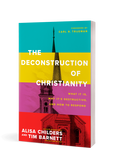|
In the purest sense of the word, literally no one takes the Bible literally. No one. Don't get me wrong—most Evangelicals would probably say they do, in fact, read the Bible literally. According to a 2011 Gallup poll, 41% of Protestants make that claim, but I suspect it all comes down to what they mean by the word “literal.” If someone asked me if I read the Bible literally, I would answer, "Yes. But to read it literally doesn't mean I take everything in it literally." This is why I'm always a little stunned when skeptics and progressive Christians demean Evangelicals by characterizing them as "literalists." I always wonder—"What do they think that means?" Is it just another way of saying “fundamentalist”?
For example, if you google “Take the Bible literally,” the first article that pops up is a piece written for the Huffington Post by “Spiritual Teacher” Steve McSwain. In it, he asserts that Fundamentalist Christians do not, in fact, take the Bible literally as they typically claim. He cites the fact that Christians no longer stone disobedient children (Deuteronomy 21:18-21) or kill people for the worship of false gods (Leviticus 20), even though the Old Testament law prescribes those punishments for those crimes. In a particularly odd and breathtaking display of ignorance regarding basic hermeneutics (biblical interpretation) and, well, grammar, McSwain claims that if we take the Bible literally, we should pray to Satan to kill Christians who are living in sin (1 Corinthians 5:1-5). His main point is that because Christians don’t take these particular passages “literally,” we are simply picking and choosing which ones we obey, which makes the whole concept of biblical authority a “charade.”
Here are four things to consider when reading the Bible:
1. Grammar (Figures of speech, anyone?) Miriam Webster Dictionary defines the word "literal" as: "adhering to fact or to the ordinary construction or primary meaning of a term or expression; free from exaggeration or embellishment; characterized by a concern mainly with facts." Sometimes the primary meaning of an expression makes use of a figure of speech—while still being factual. Let's do a little thought experiment. Close your eyes and think about the last sunset you witnessed. Bring into your memory the colors, clouds, the landscape....every last detail. Now imagine you are describing that beautiful sunset to a friend and your friend retorts, "But the sun doesn't 'set’! The sun is fixed, and the planets orbit around the sun. Your whole story is just a bunch of unscientific mumbo-jumbo." You would most likely be surprised that your friend would so easily ignore the facts of your experience simply because they didn't understand that you were using a figure of speech. In reality, not many people would respond like that—but sadly, this is how many skeptics respond to the figures of speech in the Bible. Allow me to introduce you to "The Golden Rule of Interpretation." This is the starting point for understanding the Bible:
This is just good grammar, and most people know it intuitively. For example, I have never met anyone who believed that Jesus was an actual door, a shepherd, a stone, a loaf of bread, a lion, a root, or a vine.... or that His followers are actual salt, light, branches, or sheep. (2) These are easily recognized metaphors that only require a bit of common sense to spot. But it's very important to note that all of these figures of speech have a literal meaning or interpretation behind them—and in many cases, the Bible goes on to explain exactly what those meanings are. (3)
2. Hermeneutics (What about those Old Testament passages?) Hermeneutics is simply the discipline of interpreting the Bible. One key to good hermeneutics is understanding the relationship between the Old and New Testaments. The Old Testament is largely focused on Israel, God’s chosen people. It was very important to God to preserve and set His people apart from other nations, because it was from the nation of Israel that the Messiah would come. Therefore, God made a special covenant with Israel that He didn't make with anyone else. There were certain laws and rituals including various sacrifices offered in the tabernacle and later the temple, ceremonial laws, purity laws, dress codes, dietary laws etc. Also, the Old Testament Mosaic law was always understood to be temporary. Jeremiah 31 and Ezekiel 36 look forward to a new covenant which would replace the old one. It was never meant to binding on all people of all times. However, the moral law that we find in the Old Testament was binding on all people, and is still binding today, because those laws are a reflection of God's nature and character. Surrounding nations were judged if they didn’t repent for their moral sin. How do we know what the moral law is? Any command repeated in the New Testament is a good place to start. The cleanliness laws forbade the Israelites from touching lepers and dead bodies. When Jesus the Messiah came in the New Testament, he touched lepers and corpses. He also declared all foods clean. These were hints of what was to come: when the veil in the temple was torn at His death, the need for the entire sacrificial system with its cleanliness laws was done away with. His death paid the penalty for sin, thus ending the prescribed earthly punishments for sins like disobedience and the worship of false gods. So if we went around stoning disobedient children and false god-worshipers, we would actually be misunderstanding and disobeying the Bible—and denying the work of the resurrected Jesus upon which our faith is grounded. 3. Genre (Poetry or history?) The Bible is not simply a book. It's a collection of books that were written over a period of about 1,500 years by 40 different authors. Just like the books we are all used to reading today, the different books of the Bible have different genres. Biblical genres include poetry, biography, prophecy, and historical narrative to name a few. The Bible contains allegories and parables and sometimes uses poetic language within a historical narrative. This is simple enough when distinguishing between a command of Jesus and a proverbial truth found in the book of Proverbs or Ecclesiastes. But what about the more fantastical passages? 4. Supernatural Events (Flying horses and talking snakes?) One of the most common reasons people abandon a literal interpretation of the Bible is because some of the historical (and future) events written about are supernatural in nature. Let’s be honest...talking snakes and donkeys are difficult concepts for us moderns to wrap our heads around—let alone a first century Jewish rabbi coming back to life after lying dead in a sealed tomb for three days. This is generally referred to as an anti-supernatural bias. This bias is born out of the assumption that God doesn’t exist. If God doesn’t exist, then of course He couldn’t make donkeys talk….or blind eyes see….or the dead raised to life. But if He does exist….anything is possible. C.S. Lewis rightly noted, “But if we admit God, must we admit Miracle? Indeed, indeed, you have no security against it.” (4) Simply put, if God exists, the miracles and supernatural events reported in the Bible are possible. If I believe that God created an entire universe out of nothing, everything else is a no-brainer. Turning water into wine is no problem if God can make water out of nothing. So does the typical Evangelical take everything in the Bible literally? I don't think so, and that is not being hypocritical—it’s being consistent. Frank Turek sums it up nicely:
If you enjoyed this post, please subscribe to have my weekly blog posts delivered directly to your inbox.
References:
(1) David L. Cooper, The World’s Greatest Library Graphically Illustrated (Los Angeles: Biblical Research Society, 1942), p. 37. Accessed online on 12/18/2017. (2) John 10:9; John 10:11; Mark 12:10; John 6:35; Revelation 5:5; John 15:1; Matthew 5:13-14; John 15:5; John 10:11 (3) Two of many examples can be found in Revelation 1:20, and Mark 4:1-34. (4) C. S. Lewis, Miracles (New York: Harper Collins, 1974), pg. 169. (5) Quoted by The Poached Egg, accessed online on 1/2/2018
8 Comments
Brittany
1/2/2018 02:15:57 pm
That dude is so messed up in his thinking about us taking every fulfilled law. . .from the OT for today. . .I mean, it's the same line of trash that some misunderstanding atheists yank out of the Bible to prove their point that we don't truly live by the Bible.
Reply
Anthony Barber
1/2/2018 02:30:26 pm
Way to go Alisa! Not bad for a former member of ZoeGirl (ha-ha-ha)! Jesus said that if your hand causes you to sin, cut it off (Matt
Reply
anthony barber
1/13/2018 01:02:35 pm
Why still be skeptical? If God exists, and Jesus Christ is God-incarnate, which is what orthodox Christianity affirms, then why can't Jesus turn water to wine?
Reply
Well there are a couple of issues here. First, Alisa was only talking about the existence of God, not the whole of Christianity. She said that if God exists, then miracles are possible. And she's right about that. But she also said that our anti-supernatural bias somehow comes out of an assumption that God doesn't exist, and that's what I was disagreeing with. Even if we grant that God exists, most of us are still going to prefer natural explanations to supernatural ones, all else being equal.
Reply
Shikha
5/30/2021 11:58:31 pm
Great post! Has brought much clarity. I had been wondering about this question at the back of my mind. Thanks!
Reply
Janet Howard
6/24/2021 11:17:05 am
What would be the point of worshiping a non-supernatural God? I might as well worship my mother or anyone else.
Reply
Alison
7/26/2021 02:58:42 pm
Figures of speech are not a category of "grammar." This really should be edited so that the word "grammar" is used correctly (or not at all, as it doesn't really apply in this article). I know you care a lot about word meanings and being specific. I write this as someone who loves your work and wants it to be the best it can be. Hope this helps.
Reply
Your comment will be posted after it is approved.
Leave a Reply. |



 RSS Feed
RSS Feed


